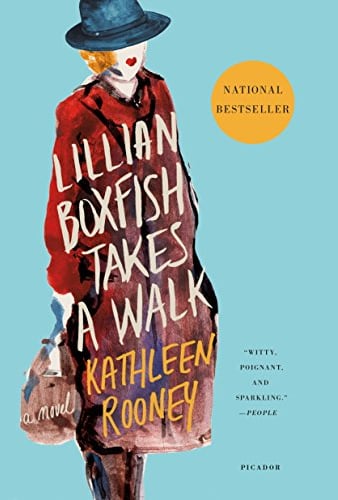Walking in Lilian Boxfish's Shoes: A Personal Reflection on the novel by Kathleen Rooney


In my first full week of summer, my family and I voyaged to the cities of Italy: Rome, Florence, Bologna, and Milan. Accompanied by my sister, mom, and uncle, we indulged in local cuisines and explored historical landmarks. As we sat down for dinner each night, we reflected on our day’s adventures and our upcoming explorations in the next city.
At the start of the trip, my uncle felt nostalgic about Rome. Having visited Rome once before, over thirty years prior, our meal-time conversations were rich with stories from his travels: driving through the countryside, making a wish in the Trevi Fountain, creating relationships with strangers. His memories helped us evaluate the changes to the city over three decades. This comparison between his past and our
present provided a unique perspective on how cities evolve over time, yet retain their history.
The novel, Lillian Boxfish Takes a Walk, offers insight into how we perceive time and the change that
accompanies it. Lillian reflects on the changes in New York City- whether that be the music taste, the
people that inhabit it, the occupations, or the city itself. Lilian remarks, “Any day you walk down a
street and find nothing new but nothing missing counts as a good day in a city you love”(Rooney 173).
Due to the constantly changing world around us, cities are experiencing change within their
architecture, inhabitants, and everyday life. Due to her long residence in New York, Lilian has
experienced the new become the old, and seen some of her favorites spots be taken away. Similar to the
historic and modern elements of New York, Italy has been able to maintain its charm while
accommodating to the ever-changing economy. Lilian’s perspective helps me to appreciate the
consistency of the city, despite changes over time.
This realization also extends to my personal values regarding travel. I found that, like Lilian’s
appreciation for New York City, I value the historical and cultural continuity in our travels more than I
thought. While local cuisine and shopping are enjoyable, it is important to experience the history and
evolution of the city.
While sharing his memories of Italy, my uncle simultaneously went out of his way to make friends with
every stranger we encountered. His genuine curiosity about other people’s backgrounds and stories
mirrored Lilian’s approach throughout the story. In one instant in particular, Lilian encounters C.J., a
Filipino grocery store clerk working near midnight on New Year’s Eve. Rather than solely making a purchase, she engages with C.J., asking, “‘If you were having a New Year’s Eve party and I were coming over, which of these flowers would you most want to see me carrying?”’(Rooney 219). As the chapter continues, C.J. and Lilian go on to form a bond, sharing family stories and future aspirations. Their encounter ends with Lilian gifting all her cash to C.J., hoping to assist him in his goals of moving to Los Angeles. Lilian’s conversation with C.J. shows her eagerness to create friendships with everyone she meets. Not afraid of the circumstances, whether that be it’s 11:00pm on New Year’s Eve or she is being mugged on the street, Lilian demonstrates an openness and kindness towards those around her. This ability to connect with others at ease highlights her genuine empathy and commitment to creating meaningful relationships.
Similar to Lilian, my uncle went beyond simple friendliness and worked to build meaningful connections. Waiting for a table at a restaurant or on a tour of the Colosseum, my uncle fostered genuine relationships that enriched our overall experience. While I was more embarrassed in the moment, Lilian’s approach taught me that personal connections go beyond mere conversations; they create lasting memories and enrich our experiences. I will always remember the taxi driver in Milan that went on and on about Caitlin Clark with my uncle kick starting the conversation. I will always remember the restaurant server in Rome that we found out was from the same Italian province as my uncle. Reading this novel has helped me to see the value in these interactions and my previous reluctance to engage in them. Lilian’s approach towards interacting with new people has helped me to be more open and appreciative of the people I meet and the lessons they can teach me.
With all of this in mind, reading Lillian Boxfish Takes a Walk has influenced how I approach future travels and conversations. It has encouraged me to value both the historical and cultural backgrounds of cities, engage more with people, and embrace the evolving nature of the places we visit.
